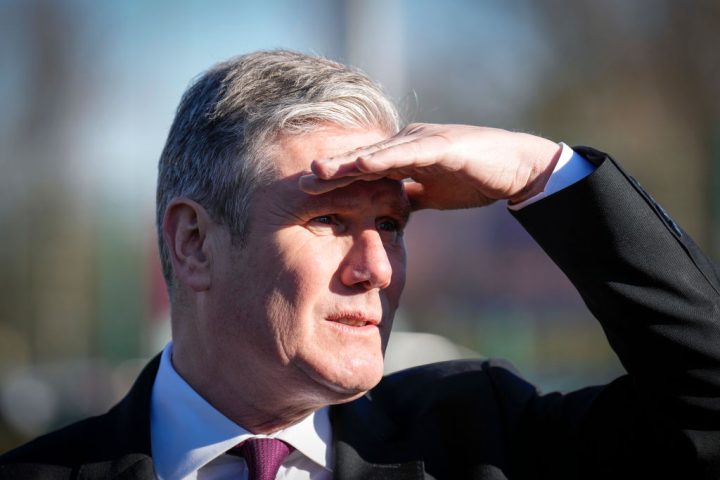On any objective assessment, things are not going well for Rishi Sunak. Despite being praised for bringing a sense of calm back to the process of government, the criteria by which he asked to be judged tell us that he is a failure. His five key objectives for the year, chosen allegedly on grounds of their achievability, are simply not on course.
The small boats full of illegal immigrants continue to land on England’s southern coast in roughly the same preposterous numbers as arrived last year; the NHS remains a horror show of delays. Even his economic metrics are refusing to come right, especially the one about halving the rate of inflation by the end of 2023.
Mandelson may have arrived with a cupboard full of flip-flops for Starmer, but people remember these things
Labour still has a mighty opinion poll lead of about 15 points and is poised to pocket an unanticipated windfall gain of about 20 seats in Scotland owing to the astonishing collapse of the SNP. So why, when assessing Sunak’s prospects, am I put in mind of the famous verdict of the French field marshal Ferdinand Foch: ‘My centre is giving way, my right is retreating, excellent situation, I am attacking?’
For one simple reason: Keir Starmer may very well be unelectable. The Labour leader’s personal poll numbers, which never reached great heights, are tumbling now. The latest YouGov survey finds that only 29 per cent of voters think he looks like a PM-in-waiting, compared to 40 per cent when he first became Labour leader. An outright majority, 51 per cent, now says he does not look like the next occupant of Downing Street and that number is on a steeply rising path. On the related question of whether Starmer is ‘doing well’ as Labour leader, the findings are similarly negative.
Sunak’s numbers, by the way, are broadly similar to this with 51 per cent saying he is doing badly as PM and 31 per cent that he is doing well. But the crucial difference is that Sunak actually is the Prime Minister. When the election comes, he will have an incumbency advantage: the status quo option who is a marked improvement on what went immediately before; the devil we know.
Recent political history tells us that for a leader of the opposition to overcome this, he must be seen as the future, the coming man, or, in the famous self-description of Jose Mourinho, ‘a special one’. The last opposition leader to clear that bar with ease was Tony Blair. David Cameron just about got over it too, exhibiting Mourinho-like levels of self-confidence when telling a soon-to-depart Blair: ‘He was the future once.’ But even Cameron fell short of an outright majority in 2010.
Setting squishy mid-term opinion poll leads aside, there is little doubt that the perceived quality of the alternative leader is one of the top determinants of general election results. Indeed, the Labour peer Lord Adonis has a theory that the question over which party has the better leader is the only test that really matters.
On that score, the clever and experienced Labour campaigners who have belatedly surrounded Starmer – Peter Mandelson, Matthew Doyle, Deborah Mattinson – will surely by now be getting a knot of anxiety in their stomachs. For the Dark Lord himself, memories of Kinnock: The Movie will be coming to the fore. This was the Labour party election broadcast in 1987, made by the film director Hugh Hudson at Mandelson’s invitation, that sought to depict Neil Kinnock in an heroic light. Its release was followed by a ‘wobbly Thursday’ in Tory central office in which Lord Young grabbed Norman Tebbit by the lapels and told him: ‘We are about to lose this f***ing election.’ Result: a Thatcher majority of 101.
Mandelson ran Kinnock again in 1992 and, having embarked upon a daring ‘modernisation’ of the Labour party that embraced both policy and personnel, few on the left were in any doubt that this time he would get over the line. He didn’t. Beaten by boring John Major who had only been in office for 18 months, playing steady as she goes. In retrospect, many of those who worked for Labour at the time can see that Kinnock was never going to be prime minister. So why would anyone assume that Starmer will be?
Labour’s leader is a dull communicator with an off-putting streak of self-righteousness and terrible political instincts that put him on the wrong side of countless political issues in the early days of his leadership. He took a knee for Black Lives Matter, effectively sided with Harry and Meghan against the Queen, declared it was wrong to say that only a woman can have a cervix, opposed the deportation of immigrant criminals and argued for Shamima Begum to get her UK citizenship back.
The Mandelson fifth cavalry may later have arrived with a cupboard full of flip-flops for him, but people remember these things. And in any case the sheer number of U-turns conducted by Starmer – not just on cultural issues but on major policy items such as free movement, student fees and nationalisation of utilities – reinforces the impression of him as deeply untrustworthy and insincere.
Of course, Sunak can still damage his chances at the next election – principally by failing to deliver on his promises to such an extent that the Tory vote sits on its hands on polling day. But anyone who thinks Keir Starmer is on track for victory is deluded: he has probably lost already.







Comments